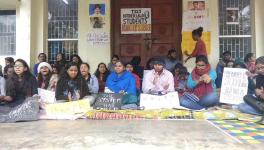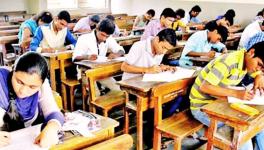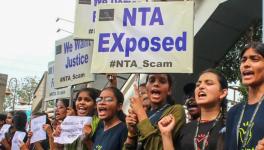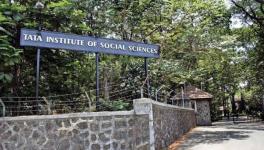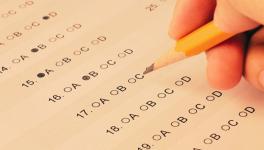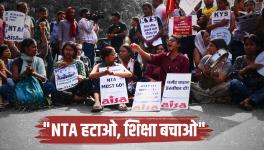JNUTA Calls for Opting Out of CUET, Says Admission Delay Led to 160+ Teaching Hours’ Loss
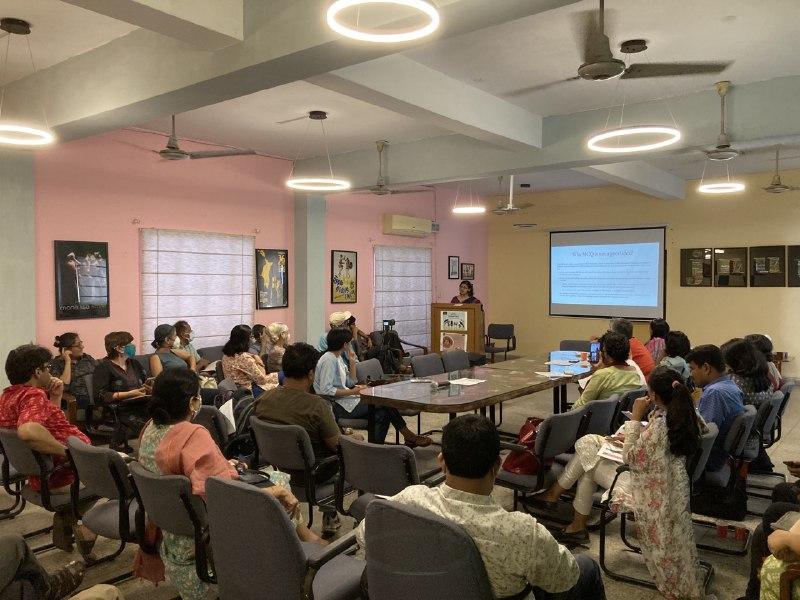
JNU Teachers drew attention to the impact of delay in admissions on the academic rigour. Image clicked by Ronak Chhabra.
New Delhi: Citing the potential number of teaching hours that are set to be lost as a result of delayed admissions to its under-graduate and post-graduate programmes, the association of faculty members of Jawaharlal Nehru University (JNU) called for withdrawal of the country’s premier higher education institute from Common University Entrance Test (CUET) on Monday.
At a press conference held at the university campus, the JNU Teachers Association (JNUTA) drew attention to the “crisis and the waste of resources” created by the adoption of CUET, that is being conducted by National Testing Agency (NTA), at different levels of the university’s entrance examinations.
As on Monday, admission to none of the university’s programmes – UG, PG, PhD or even its part-time certificate and diploma courses – had taken place, JNUTA said in a press statement, issued on Monday. The delay has already led to loss of 168 hours of teaching in the case of an under-graduate programme and 112 hours, when it comes to post-graduate programmes and PhD, the statement added.
JNU currently offers admission into a few UG programmes – with around 430 seats in an integrated BA-MA degree courses, mostly in foreign languages – along with a range of PG courses – to around 1,500 students – and PhD programmes.
Teachers pointed out that with an academic year divided into two semesters, the one termed as “Monsoon”, usually begins at JNU in July, running for the next 18 weeks; similarly, “Winter” semester starts in January. However, the monsoon semester this year is “wasted”, while lakhs of students across the country are landed into uncertainty, since no admissions have taken place so far, according to JNUTA.
“This means truncated semesters for all the academic programmes resulting in a drastic fall in the quality of teaching. This is true for all the universities across the country, which adopted for the CUET,” added the teachers’ body in a statement.
CUET, which has been made mandatory for undergraduate admission to central universities across the country for the first time, has reportedly been blighted by technical glitches from the first day (July 15), leading to tests getting postponed. The CUET has created “new pandemic-like situation” since there are still “no signs” of the new batch joining JNU anytime soon, Sucharita Sen, secretary, JNUTA, said on Monday.
“JNU is staring once again this year staring at a loss of at least 4 to 6 months of teaching for all of its programmes. This is happening at a time when the virulence of the pandemic has subsided across the country and the world,” she said.
On Monday, JNUTA also flayed the University Grants Commission (UGC) for pushing the “unthinking, chaotic, and irresponsible” ‘one nation, one exam’ policy, embodied by CUET.
Professor Ayesha Kidwai said the CUET-based system of admissions would have an “extremely adverse impact” on JNU’s educational programmes. “It is creating insurmountable losses in the field of teaching and learning for current and future generations, besides causing irreparable harm to democratic and participative governance in the university,” she said, adding, “Opting out of the CUET for all programmes is the only way forward.”
The exclusive use of multiple choice questions (MCQs) for PhD admissions is also not an academically valid practice in JNU’s faculty estimations, said Professor Debashis Ghoshal on Monday. The central university recently released the PhD prospectus for the academic session 2022-23, according to which candidates seeking admission have to appear in a computer-based test.
On a question by Newsclick on whether the said concerns regarding CUET were shared with the administration, Bishnupriya Dutt, president, JNUTA, responded by suggesting that the primary reason why JNU finds itself in such a “disastrous situation today” is because of the “complete collapse of JNU’s statutory bodies,” over the years.
“Since past four to five years, there has been a breakdown of communication between the administration and the teachers. The Academic Council has been reduced to a rubber stamp for decisions that only harm the institution. Things have not been easy which is also why teachers are having to speak to the media directly,” she said.
Students Continue Indefinite Strike
Meanwhile, on Monday, JNU Students’ Union also vowed to continue their indefinite sit-in strike until “concrete steps” by the administration are taken to address students’ grievances.
Monday marks the ninth day of the strike action though which the JNUSU is aiming to bring to the fore issues pertaining to university infrastructure, delay in scholarship disbursal, targeting of student activists, among others.
“We demand the VC (Vice Chancellor) to call for a meeting with the students’ union and share the steps taken by the administration to address multiple students’ grievances,” Aishe Ghosh, president, JNUSU told Newsclick on Monday. JNUSU is also demanding that the central university restores its admission process, instead of relying on NTA.
Earlier, JNU used to admit students to undergraduate courses through subjective exams conducted by it. From 2019 however, it started admitting students through the JNU Entrance Examination conducted by the NTA.
Get the latest reports & analysis with people's perspective on Protests, movements & deep analytical videos, discussions of the current affairs in your Telegram app. Subscribe to NewsClick's Telegram channel & get Real-Time updates on stories, as they get published on our website.









